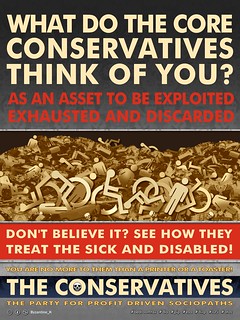
Garbage - Grey by Byzantine_K
Recently, I've been reading about how some small businesses are figuring out ingenious ways to reduce employee hours or hire contractors to avoid the need to offer health insurance because of the Affordable Care Act.(Obamacare)
Remember, small businesses must offer healthcare insurance under certain conditions: "Employees with more than 30 hours of service per week or 130 hours of service per month must have access to employer-sponsored health care benefits at companies with 50 or more full-time employees and full-time equivalents."
I gave a practical example of this kind of action in an earlier article "Due to low wages and few benefits, Walmart workers at a single 300-person Supercenter store rely on anywhere from $904,542 to $1,744,590 in public benefits per year, costing taxpayers, according to a new report from the Democratic staff of the House Committee on Education and the Workforce."
Although these kinds of business tactics are shortsighted and cost society a great deal of money, they don't surprise me. Business folks are smart and resourceful. They can be depended on to do what's necessary to maximize their profits. It's the first principle of business. Lately, it seems to be the only principle of business.
What surprises me is how the taxpayers are so oblivious to the efforts of the business community to privatize their profits and share the costs of their profit-protecting tactics with the public.
But there is a little bit of good news. I read of a New York sushi restaurant that eliminated tipping the wait staff by paying a living wage and some benefits. And by doing so has probably saved the taxpayers money in government provided benefits that go to the working poor.
Most people don't know that a New York restaurant can pay as little as $2.25 per hour on the assumption that the wait staff will make up the difference between that amount and the minimum wage in tips. Sometimes they do and sometime they don't.
Even at the minimum wage, most serving-staff in restaurants are considered the working poor and depend on government benefits to survive. And they're not alone.
From the Wall Street Journal article titled, "Who Makes Up the "Working Poor' in America? by Sudeep Reddy
"Roughly 46 million people in the U.S., or 15% of the population, lived below the official poverty line in 2011 ($11,484 for an individual or $23,021 for a family of four per year). About 10.4 million of them are considered part of the "working poor." That means they spent at least half the year in the labor force (working or looking for work), but they still fell below the poverty level.
Part-time work is only half the problem. About 4.4 million people who usually worked in full-time jobs were classified as working poor in 2011. That's about 4% of all full-time workers. About 14% of part-time workers were classified as working poor.
The service sector accounted for 3.3 million of the working poor in 2011. About 13% of all service workers were classified as working poor. About 17% of workers in farming, fishing and forestry jobs were part of the working poor. And about 10.6% of workers in construction and extraction roles were working poor."
I understand Republican's continual efforts to defund government social programs. It's their thing you know, small government, except the military. But the cheese gets a bit more binding when they keep working to reduce the tax load on businesses and ignore the fact that some of these businesses are off-loading costs onto the taxpaying public.
Employees are human beings. Human beings need health care, housing, nutrition, clothing, etc. In a capitalistic society, those needs require money. Who's going to pay? Either business pays a living wage or government provides a safety net and we, the taxpayers, pay for it.
Which way do we want it? Higher prices and living wages or higher taxes and government social programs to make up the difference. Or we can act like the working poor don't exist. Good luck with that!
(Note: You can view every article as one long page if you sign up as an Advocate Member, or higher).





